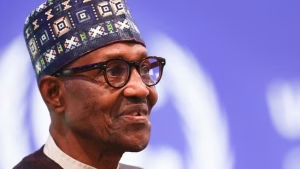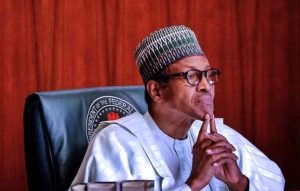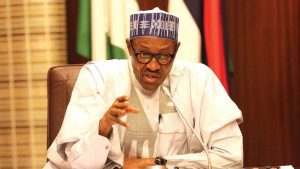Former Nigerian President Muhammadu Buhari Dies at 82 After Battling Prolonged Illness in London
Former Nigerian President Muhammadu Buhari has passed away at the age of 82 in London, United Kingdom, following a prolonged illness. The Muhammadu Buhari death was confirmed by President Bola Ahmed Tinubu in an official statement released on Sunday, July 13, 2025. Tinubu noted that Buhari died around 4:30 PM local time (1530 GMT), although the specific nature of his illness was not disclosed to the public.
This marks the end of an era for Nigeria’s political landscape, as Buhari had been both a former military ruler in the 1980s and a two-term civilian president from 2015 to 2023. His death has sparked mourning across the country and ignited discussions surrounding his complex legacy, both as a statesman and as a deeply controversial leader.
Also Read : Oprah Winfrey Opens Up About Her Battle with Body Image and the Truth Behind Her Weight Loss Journey
 Medical History and Cause of Muhammadu Buhari’s Death Remains Unconfirmed Amid Longstanding Health Speculations
Medical History and Cause of Muhammadu Buhari’s Death Remains Unconfirmed Amid Longstanding Health SpeculationsWhile President Tinubu cited a “prolonged illness” as the cause of the Muhammadu Buhari death, no official diagnosis has been released by the family or government. Buhari’s failing health had long been a topic of public concern, especially during his presidency when he frequently sought medical treatment abroad—most notably in the United Kingdom.
Reports from sources close to the family suggest that Buhari had been receiving intensive care in London for several months before his death. According to investigative reporting by Sahara Reporters, the former president had been suffering from a combination of aging-related complications and digestive issues. Although aides previously attempted to downplay the seriousness of his condition, the Muhammadu Buhari death confirms the longstanding suspicions regarding his critical health status.
Buhari’s Extensive Medical Trips Abroad Spark Renewed Criticism of Nigeria’s Failing Healthcare System
Throughout his presidency, Muhammadu Buhari death remained tied to the issue of medical tourism. From 2015 to 2023, Buhari spent over 230 days abroad for medical reasons, including a single 104-day stay in London in 2017. Critics consistently condemned these absences, arguing that they highlighted the inadequacy of Nigeria’s healthcare system and the government’s failure to invest in public medical infrastructure.
Medical professionals, such as Dr. Osahon Enabulele of the World Medical Association, openly criticized Buhari’s behavior, calling it emblematic of the government’s misplaced priorities. Civil society organizations also questioned the secrecy surrounding his health, demanding transparency in leadership—something that never materialized during his tenure.
Military Strongman to Democratically Elected President: The Two Sides of Muhammadu Buhari’s Political Career
The Muhammadu Buhari death brings to a close one of Nigeria’s most polarizing political journeys. Buhari first rose to national prominence as a military ruler following a coup in 1983. His strict and authoritarian leadership style earned him a reputation for discipline but also for suppression of civil liberties.
After decades in the political wilderness, Buhari re-emerged as a civilian leader, winning the 2015 general election as the candidate of the All Progressives Congress (APC). His election was historic, marking the first time an opposition candidate defeated a sitting president in Nigeria.
Buhari campaigned on a promise to fight corruption, strengthen national security, and revive the economy. While he was lauded for initiating several anti-corruption efforts, many of these measures were seen as politically selective, often targeting opposition figures while sparing allies.

Critics Reflect on Buhari’s Leadership Record: Security Failures, Economic Stagnation, and Declining Public Trust
In the wake of the Muhammadu Buhari death, many are reevaluating his presidency, especially in light of persistent national issues. Despite initial optimism, Buhari’s administration was unable to resolve the widespread insecurity plaguing Nigeria. The Boko Haram insurgency persisted in the northeast, while violence from armed bandits and separatist movements spread across other regions.
Economically, his tenure witnessed two recessions, inflation spikes, and a sharp decline in oil revenues. Buhari’s critics often pointed to his rigid economic policies and slow decision-making style—earning him the moniker “Baba Go Slow”—as detrimental to Nigeria’s growth.
In a 2020 opinion piece, Nigerian author Chimamanda Ngozi Adichie described Buhari’s leadership as “a failure,” noting his government’s “wilful indifference” and ineffectiveness. Her words have resurfaced in the aftermath of the Muhammadu Buhari death, serving as a poignant critique of his legacy.
National Mourning and Global Condolences Pour In Following Buhari’s Passing
In response to the Muhammadu Buhari death, President Tinubu declared a three-day national mourning period. Flags across government buildings were ordered to fly at half-staff in respect. Tinubu also directed Vice President Kashim Shettima to travel to London to accompany Buhari’s remains back to Nigeria.
World leaders, former presidents, and international organizations have expressed their condolences. Tributes have emphasized Buhari’s commitment to national service and his role in shaping Nigeria’s democratic journey—however turbulent it may have been.
In Nigeria, reactions remain mixed. While some Nigerians mourn his passing with reverence, others view it as a moment to reexamine leadership standards and demand better governance moving forward.


As Nigeria processes the Muhammadu Buhari death, attention now shifts to what lies ahead. The Tinubu administration, already facing its own criticisms, must choose between continuing Buhari’s political framework or charting a new course.
The challenges Buhari failed to resolve—corruption, insecurity, economic decline, and a weakened healthcare system—still loom large. For many Nigerians, his passing is not just the end of a political era but a wake-up call to demand genuine reform and accountability from current and future leaders.

